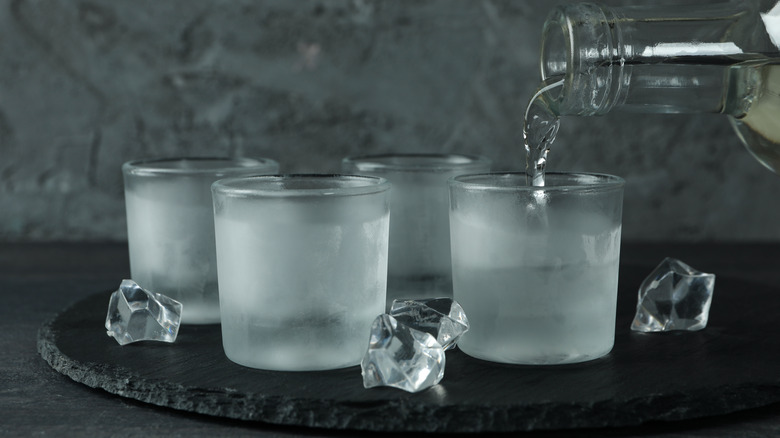There Could Be Secret Ingredients Hiding In Your Vodka. Here's Why
Most of us don't sit down with a vodka cocktail and think we're about to enjoy health food, but did you know that some brands of booze take more care over the ingredients they choose? Liquor companies have a long history of hiding their products' nutrition info. But how do they get away without labeling ingredients? There's actually quite a lot of history to this answer, stemming from Prohibition (via Vox). Few people realize that alcohol isn't regulated by the Food and Drug Administration but rather by the Alcohol and Tobacco Tax and Trade Bureau, an agency that doesn't require nutritional labeling.
Liquor providers are required to post alcohol content and add an alert if their product contains a substance some people may be sensitive to, such as sulfites or yellow No. 5 dye. But if you want to avoid pesticides or common allergens, or check the calorie count — sorry, not required.
"The spirits industry does not have the same transparency requirements as other food and beverage industries due to antiquated laws that go back to the Prohibition era," Kristen Risk, co-founder of Frankly Organic Vodka, explained in a statement sent to Mashed. "The reality is that there is an overabundance of undesirable ingredients in alcohol, including refined sugars, artificial colors, and flavors. I think the industry is opaque because it hasn't been required to be anything else."
Some distilleries list the ingredients in their vodka
Consumer advocates and health experts have been trying unsuccessfully for decades to get the government to require nutrition labels on vodka and other liquors, according to Vox. People repeatedly get the message to drink responsibly — to know their limits when it comes to alcohol consumption. But experts say a lot of people are unaware of basic nutritional information about alcohol, such as how many calories are in a serving of beer, wine, or distilled spirits.
The organic liquor business is filling this void by being transparent. Consumers of organic liquor can rest assured that all the ingredients have no added chemicals or toxins, and aren't genetically modified. If the label says "made with organic," the ingredients must be 70 percent organic (via Fat-Burning Man). While Frankly Organic Vodka doesn't claim you will get any health benefits from choosing their product, at least people know what they're drinking (via Frankly Organic Vodka). They told Mashed they are "the first spirit brand in the world to include ingredients, along with nutritional content, on the label."
Another popular brand in this market is Ocean Organic Vodka, who explain on their website they have an organic distillery and a farm where they grow their own sugar cane. Both brands also highlight their charitable donations, to cater to ethically minded consumers. Those who prefer to shop local can find regional organic options such as Bluewater Organic Distilling, which has a tasting room in the Pacific Northwest (via Bluewater Organic Distilling).

